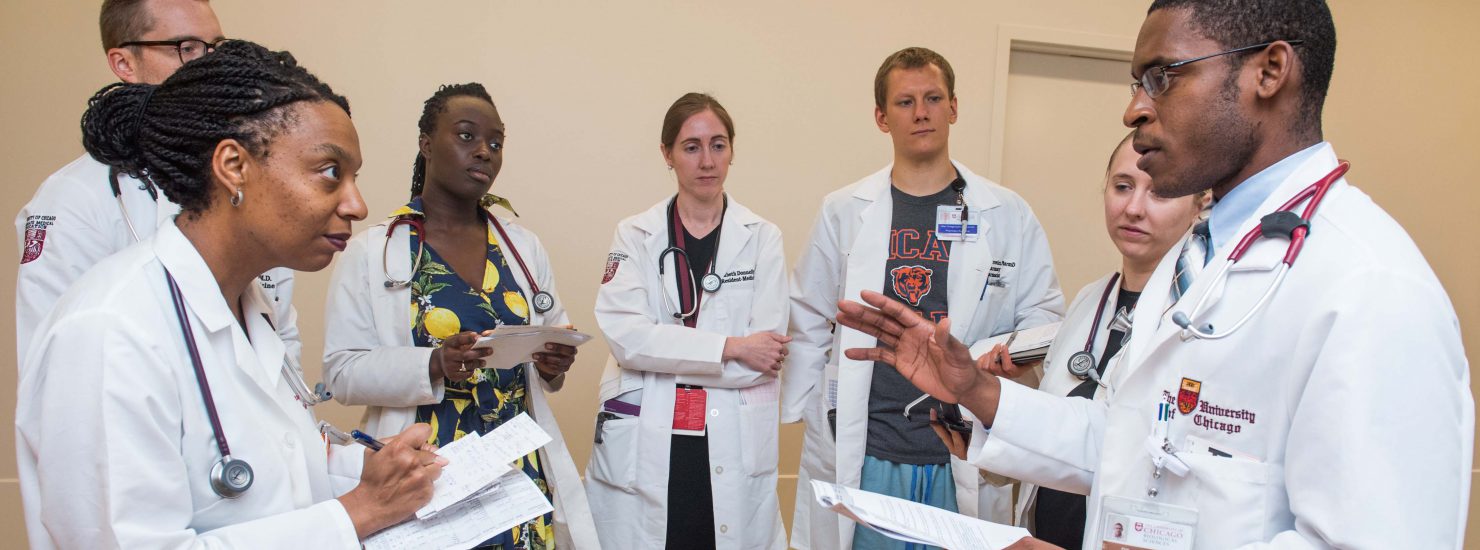Overview

Deborah Burnet, MD
Chief, Section of General Internal Medicine
University of Chicago
Department of Medicine
Section Chief’s Welcome
As a former University of Chicago trainee in General Internal Medicine and Pediatrics, I am delighted and honored to lead our Section, building upon our tradition of strength and growing in new and exciting directions. The Section of General Internal Medicine (GIM) encompasses a highly talented, very collegial and committed faculty who are recognized nationally in the areas of medical education, ethics, clinical care and research in healthcare disparities and outcomes. The Section continues to be recognized for its significant teaching efforts and leadership in the Pritzker School of Medicine as well as its strong community partnerships and outreach programs.
Recent accomplishments include studying the impact of the Affordable Care Act (ACA), resulting in increased demand for primary care for many more medically complex patients. GIM is utilizing the clinical and health services research expertise of our faculty to implement population health management strategies and coordinate care for the sickest patients on Chicago’s South Side.
GIM houses many outstanding multidisciplinary academic centers and programs including the MacLean Center for Clinical Medical Ethics (Mark Siegler, MD- Director), Chicago Center for Diabetes Translation Research (Marshall Chin, MD and Monica Peek, MD- Directors), the RWJF Finding Answers: Disparities Research for Change (Marshall Chin, MD- Director), and the Center for Translational and Policy Research for Chronic Diseases (Elbert Huang, MD- Director).
Many GIM faculty play key leadership roles in medical education at The University of Chicago serving as directors for the internal residency program, medical student courses and fellowship programs. We take pride in “teaching the teachers” through several faculty development programs, CME offerings and our fellowship programs in health services research, medical ethics, and medical education.
We invite you to learn more about the teaching, research, and clinical activities of our dynamic Section through contact with individual faculty members and programs.
About the Section
General Internal Medicine (GIM) has a rich tradition at The University of Chicago, dating back to the founding of the medical school in 1927. With the rising prominence of the medical subspecialties after World War II, the Department of Medicine reaffirmed its commitment to GIM in 1969: “Every trainee must receive intensive, comprehensive training in General Medicine as an optimal base for advanced training, whether in a subspecialty or General Internal Medicine.” Under the leadership of Dr. Alvin Tarlov (Chair of Medicine, 1968-81), The University of Chicago led a national effort to reestablish academic sections of General Internal Medicine. In 1973, the Section of General Internal Medicine was organized to include separate GIM inpatient, outpatient, and consultation services. The Section of General Internal Medicine assumed responsibility for housestaff training and for relationships with community hospitals. A fellowship program was established for trainees interested in academic GIM and educational leadership. With the support from our Department Chairs since 1968 ,GIM research has flourished at The University of Chicago, with faculty recognized as national leaders in the areas of medical ethics, health economics and policy, health services and outcomes research.
Research Accomplishments
General Internal Medicine research at The University of Chicago encompasses studies of health services and health disparities, care for vulnerable populations, medical ethics, cost effectiveness and quality of care in various settings. Our researchers have established a vibrant program of research with support from such agencies as the National Institutes of Health, the Agency for Healthcare Research and Quality, the Centers for Disease Control, the Robert Wood Johnson Foundation, and other prestigious venues, and publishing in the New England Journal of Medicine, the Journal of the American Medical Association, the Journal of General Internal Medicine, and other national and international publications. GIM research faculty collaborate broadly with faculty from the Departments of Public Health Sciences, Sociology, Economics, Pediatrics, and the Harris School of Public Policy Studies, and many hold joint appointments as evidence of their interdisciplinary scholarship.
Education and Training
General Internal Medicine faculty play leading roles in medical education efforts at the student, resident, fellowship level, and faculty development levels. In the Pritzker School of Medicine, GIM faculty serve as course directors for Clinical Pathophysiology, the Doctor Patient Relationship in Clinical Practice and the Junior Clerkship in Medicine, as well as many elective courses. At the level of Graduate Medical Education, several GIM faculty members serve as Program Directors, Associate Directors and Core Faculty for our Internal Medicine and the Medicine-Pediatrics residency programs. We take pride in “teaching the teachers” through our General Internal Medicine research fellowship, the MacLean Center Fellowship Program (which has now trained more than 300 clinicians and leaders in Medical Ethics), and the MERITS fellowship in Medical Education. Through mentoring relationships, CME offerings, and important leadership roles within the Society of General Internal Medicine and other professional organizations, we further extend the reach of our professional development activities.
Patient Care
General Internal Medicine faculty members are dedicated to providing the highest quality of care to a large and diverse patient population. We conduct approximately 60,000 outpatient visits annually in the Primary Care Group in the Duchossois Center for Advanced Medicine, and many more patients downtown in our River East practice. GIM faculty care for thousands of patients in the Center for Care and Discovery (CCD) each year, and we oversee and direct the work of students and residents in both the inpatient and outpatient settings. Our clinical care coincides with our efforts to study and improve patient outcomes through extensive quality improvement programs and related health services research.

